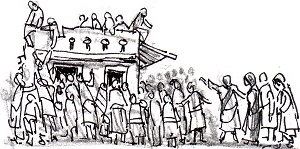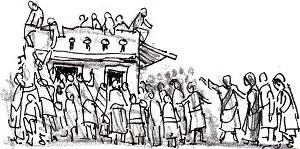

“My mother and my brothers are those who hear the word of God and act on it” (Luke 8:21).
Proverbs 21:1-6, 10-13; Luke 8: 19-21
We need to understand the importance of family and tribal loyalty in ancient culture to appreciate how shocking it was for Jesus to claim a higher loyalty for his disciples than their own brothers, sisters and mothers. With members of his blood family waiting outside, Jesus publicly declared that those who hear God’s word and keep it were equal to those central relationships in his life.
The Gospel of Mark gives a dramatic context to this encounter. In Chapter 3, Jesus is already in full confrontation with the religious authorities over healing on the Sabbath. Large crowds from all over are flocking to hear him preach. His critics accuse him of being possessed by Satan. His family hears of this commotion and comes “to take charge of him saying, ‘He is out of his mind’” (3:20). They were not there to visit Jesus; they came to assert family authority over him.
Jesus, once so familiar to his neighbors and relatives as just the local carpenter, had burst onto the scene as a miracle worker, exorcist and spell-binding preacher who was challenging synagogue leaders, arguing with scribes and Pharisees and even the inquisitors sent from the temple in Jerusalem. He was under surveillance by Roman authorities and by Herod’s agents for his close ties to the fiery radical, John the Baptist. Trouble was in the air and this upstart preacher from the hill country of Galilee was clearly “out of his mind.”
All of this deepens our focus on Jesus’ claim that the word of God was guiding him. Like the prophets of old, he was willing to defy every threat, pressure and influence to carry out his mission. His determination to risk his life in Jerusalem even began to disturb his disciples. When he spoke of being rejected and killed there, Peter sought to take charge of him, and for this Jesus rebuked him, calling him “Satan.”
If we did not know the Gospel’s outcome and were entering the story of Jesus at this point, what would we have thought? This may be the challenge of today’s Gospel, for are we not in the middle of our own stories, facing questions about our own deepest loyalties and commitments? Where do we stand on important issues facing our generation, our moment in history? What family influences and social pressures do we bow to in our opinions and actions, either to go along, to dissent or remain silent, waiting and watching or deciding and acting?
The Gospels are filled with tension. The Word of God comes to us to stir questions in us, to draw us into scenes and parables that confront us with our own stances before God and in our relationship with Jesus as one of his disciples. How do we let the Word stir us to life and give us the confidence that, as Jesus proclaimed in Nazareth, that “this word has come true in our hearing” and is about us, here and now?
Advertisement








